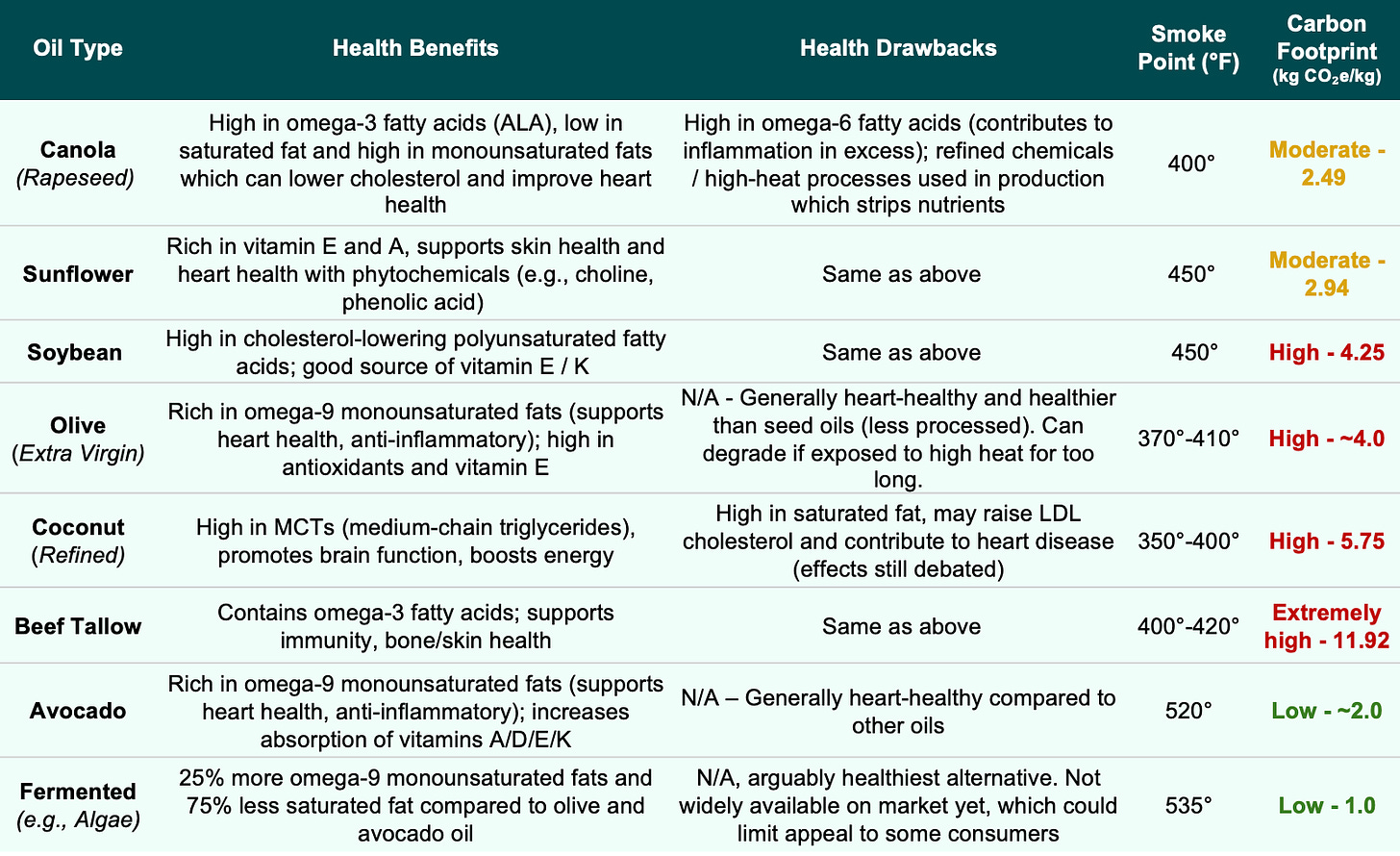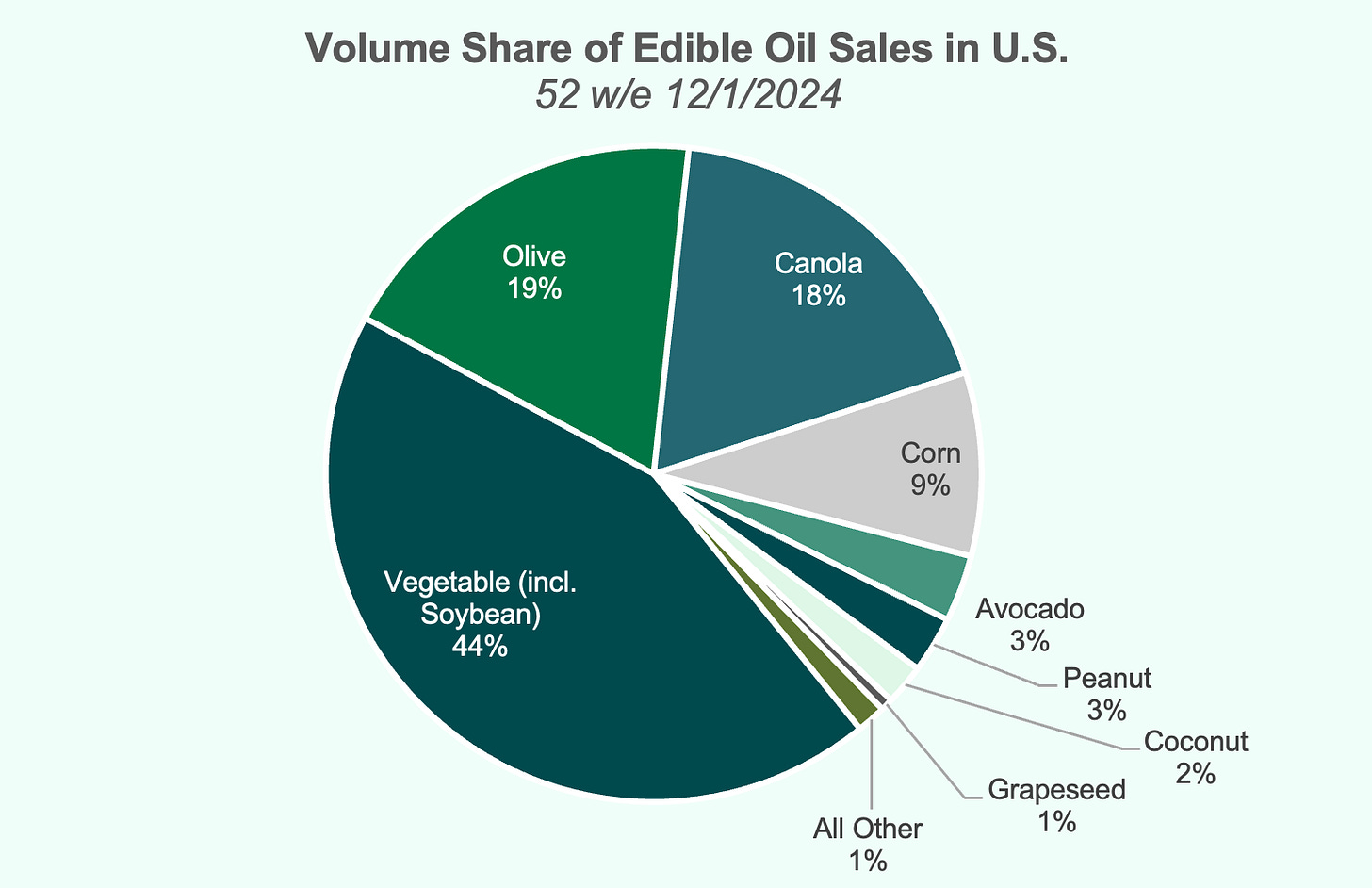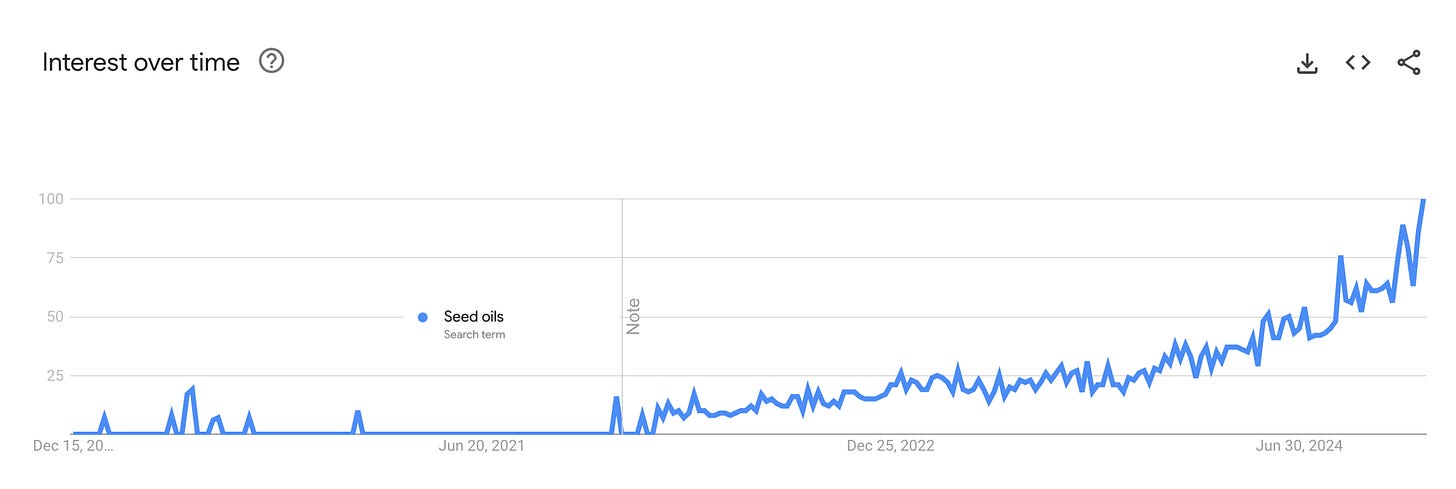Fats, Fads and Facts: Unpacking the Oil Craze
Are seed oils cancelled? Are coconut oil or beef talIow the right replacements? Read on to hear our take, and to learn about some recent oil innovations we’ve had our eye on.
It’s understandably easy to get confused by the latest hype surrounding oils and fats – the current cultural dialogue around oils of all types reflects both shifting dietary trends and a deeper consumer reckoning with sustainability, health, and taste, our 3 pillars at Great Circle Ventures.
TL;DR
Oils Rise and Fall: The health and sustainability scrutiny surrounding seed oils like canola and soybean, long praised for their affordability and "heart-healthy" benefits, has led to polarized debates about their place in the modern diet. At the same time, coconut oil, which once enjoyed a moment in the spotlight as a superfood, has since seen its reputation waver under scrutiny about its saturated fat content. Confused about what to eat? It’s understandable!
Beef with Beef Tallow: A counter-trend away from oil has emerged, with brands like Masa championing animal-based fats such as beef tallow as a healthier alternative to seed oils. However, given the high saturated fat content and negative environmental impacts, it’s clear better alternatives are still needed.
Next-Gen Oils: Luckily, a new wave of sustainable, healthy oil alternatives are entering the market. Avocado oil and fermented oils are gaining popularity as sustainable and nutrient-dense alternatives, with new players including Algae Cooking Club and west~bourne.
Fresh Formats: Formats for consuming oil are evolving as well, as companies reimagine modalities like squeezable bottles (Graza) and oil “shots” (Alya) to turn oil from a commodity into a hip consumer product.
The global cooking oil market size reached over $200B in 2023 ($30B in the US), and is projected to grow at a CAGR of 6-7% through 2032. While traditional oils, particularly those derived from seeds and soybeans, dominate this landscape, alternative oils are rapidly gaining traction, supported by a rising demand for products that are both healthier and better for the planet, as well as advancements in food technology making this new reality possible.
Source: Circana MULO+
The rise and fall of seed oils
Seed oils have officially hit the cultural hot seat. Once lauded as “heart-healthy” and added to everything from salad dressings to snack foods, these oils (primarily soybean, corn, and canola) are now finding themselves the target of scrutiny and skepticism, even getting wrapped up in political dialogue, with RFK making the anti-seed oil movement a core component of his food and health agenda ("MAHA”). Regardless of political viewpoints, many health-conscious consumers, investors, and brands alike are starting to question whether these oils deserve a place in our diets, whether due to their negative health repercussions or environmental sustainability concerns.
Source: Google Trends - Rise in consumer searches for seed oils over the last 5 years
Just a brief snapshot of the anti-seed oil momentum gaining steam:
The Seed Oil Scout is an app entirely dedicated to tracking down seed oil-free restaurants, helping those aboard the anti-seed oil train find places where their meals are safe from these ingredients.
Social media platforms like Instagram and TikTok have seen a surge in influencers and health enthusiasts advocating against seed oils over the last couple of years, one of few “diet trends” that has stuck around
The New York Times weighed in recently with an article dissecting the potential health risks of seed oils, including inflammation and chronic disease, while highlighting the controversy around misleading claims.
Sweetgreen, a giant in the “clean” eating space, is testing out fries that use avocado oil and avoid seed oils altogether, while Shake Shack has switched to using Zero Acre Farms fermented oils for frying its french fries, suggesting a shift in its customers’ preferences as other fast casual and restaurant chains follow suit.
Even renowned chefs and restaurants including Eleven Madison Park are also revisiting their cooking practices, opting for traditional fats like butter and lard as well as new fermented oils made out of algae over seed oils, aiming to align with the growing demand for natural and less processed ingredients
Source: REP Provisions, Seed Oil Scout
How did we get here? For centuries, ancient societies predominantly consumed animal fats such as butter, tallow, and lard, which provided essential nutrients such as fat-soluble vitamins (A, D, E, K) and omega-3 fatty acids that promote brain development, immune function, hormone regulation, and other bodily functions. Unsurprisingly, modern health issues such as obesity and diabetes were of little to no concern in an era of largely unprocessed diets.
Seed oils (including cottonseed oils, sunflower oil, canola oil, soybean oil, and corn oil) first emerged in the U.S. in the mid-20th century as byproducts of industrial agriculture. Originally used in manufacturing and machinery, these seed oils transitioned into the food system at the same that processing techniques, such as hydrogenation and refining, made them more stable and suitable for cooking. Following WWII, the U.S. government ramped up support for farmers through subsidies on soy and corn—now foundational ingredients for seed oils. These incentives made seed oil production cheaper, driving down costs for food manufacturers and enabling seed oils to proliferate across processed foods.
With their affordability, neutral taste, and versatility, seed oils soon became foundational in processed snacks, fast food, and baked goods, where they added structure, extended shelf life, and suited high-heat cooking needs. Today, vegetable oils are estimated to make up 8-10% of total energy intake in the Western diet, with seed oils being a key contributor. Even as research about and awareness of the negative health effects and environmental impact of these seed oils spreads, the economic advantages they provide (low cost, high availability) and ingrained subsidy support make them a fixture in many staple foods today.
However, a variety of health and sustainability concerns have given seed oils a bad reputation:
Health Concerns
Consumers and health experts have expressed growing concerns about seed oils’ potential impact on health, as these oils are typically high in omega-6 fatty acids, which, in excess, can contribute to inflammation and chronic health conditions. While omega-6s are essential nutrients in small volume, study published in the journal Nutrients found that the standard American diet has an omega-6 to omega-3 ratio of 16:1, far above the recommended ratio of 4:1 or lower. This imbalance has been associated with increased risks of conditions such as heart disease, obesity, and autoimmune disorders.
Source: Food and Agriculture Organization of the United Nations (FAO) and the World Health Organization (WHO)
Emerging research suggests that seed oils, which contain high levels of linoleic acid (LA), may not only be increasing inflammation in the body, but also impacting our brains in ways that could hinder cognitive development. While small amounts of LA are a natural part of the diet, our current intake, driven by highly processed foods and seed oils, may be disrupting the brain-supporting balance of fats essential for optimal cognitive health.
What are the drawbacks? For optimal brain health, two long-chain polyunsaturated fatty acids play critical roles in development: 1) DHA, an omega-3 fatty acid abundant in seafood and crucial for developing the frontal cortex, and 2) AA, an omega-6 fatty acid found in red meats, chicken and eggs. However, the LA in seed oils competes with DHA for space within our cells, preventing DHA from integrating effectively and performing its brain-supporting functions. High LA intake during pregnancy has been linked to an increased likelihood of Autism Spectrum Disorder (ASD) symptoms in children by age six. Elevated LA levels have also been associated with increased rates of depression and other psychological disorders.
Additionally, many seed oils are heavily refined, undergoing processes like bleaching, deodorizing, and chemical extraction using hexane, which can leave trace residues. These methods also strip oils of naturally occurring antioxidants and nutrients, leading to a product that’s more calorically dense but nutritionally void. A 2024 survey by the International Food Information Council found that nearly 1 in 5 consumers expressed interest in decreasing their consumption of heavily processed ingredients, a sub-segment of the 84% of Americans who claim shifting towards a healthier diet is important to them. A study by Ingredion revealed that 44% of consumers now check both ingredient and nutrition labels more than they did the previous year, up from 35% in 2020, indicating a growing demand for transparency and natural components in food products.
Sustainability Concerns
The production of traditional seed oils, such as soybean, canola, and sunflower oils, also poses significant environmental challenges. Intensive agricultural practices associated with seed oil production often involve heavy use of fertilizers and pesticides; these chemicals can lead to soil degradation, water contamination, and loss of biodiversity. For example, nitrogen-based fertilizers used in canola farming can leach into waterways, causing eutrophication and harming aquatic life.
The worst culprit? Unfortunately, despite comprising the highest share of edible oils consumed in the U.S., Soybean Oil emits the highest GHGs among cooking oils (4.25 kg of CO₂ equivalent per kilogram of refined oil). Its production involves extensive water and land use – nearly one fifth (18.4%) of deforestation, or 950,000 hectares per year, is driven by cropland expansion for oilseeds, dominated by soybean and palm oil.
As consumers become aware of the negative environmental impact of seed oils, they increasingly seek not only healthier but also more sustainable solutions – consumers today are willing to spend an average of 9.7% more on sustainably produced or sourced goods, even amid cost-of-living and inflationary concerns.
How does coconut oil stack up?
Coconut Oil has oscillated between being hailed as a superfood and criticized for its health risks. It experienced a rise in popularity during the 2010s, promoted as a “superfood” by advocates pointing to its high medium-chain triglyceride (MCT) content, which is thought to promote energy expenditure and fat metabolism (particularly for ketogenic diets), and its lauric acid, linked to antimicrobial properties. Given its versatility, coconut oil also gained favor in the natural health world for its use as not only a cooking oil but also in many cosmetics, moisturizers and hair care products.
However, experts soon began to raise concern about coconut oil, cautioning that the health benefits of coconut oil remain largely unsupported by robust evidence. Researchers went on to bash the high saturated fat content (around 80-90%), and researchers at the American Heart Association demonstrated results that coconut oil significantly increases LDL ("bad") cholesterol, which may contribute to heart disease, despite also raising HDL ("good") cholesterol. Aside from health risks, there have been claims that the deforestation caused by coconut oil production is equivalent to or more severe than that of palm oil. Our take? While fine to consume in moderation, there are healthier and more sustainable oil alternatives out there!
What’s the beef with beef tallow?
If you’ve been following the news recently, you’ve likely also been inundated by information and advertisements about beef tallow as a replacement for oils. Made from rendering fat from cattle (slowly cooking the fat over low heat until it melts and separates from other tissue), beef tallow is an off-white substance solid at room temperature and prized for its high smoke point, long shelf life, and ability to give foods a rich, savory flavor.
A growing number of CPG food and snacking brands are rejecting conventional seed oils and coconut oil in favor of beef tallow, including Masa tortilla chips, which markets its line of traditional tortilla chips as “seed oil free” front and center on its packaging.
Source: Snaxshot
Those promoting increased use of beef tallow as a replacement for seed oils point to its fat-soluble vitamins that support immunity, bone health, skin health, and more. However, like butter and coconut oil, beef tallow is predominantly comprised of saturated fat, and while it also contains healthier monounsaturated and polyunsaturated fats, excessive saturated fat consumption has been linked to heightened risk of heart disease and increased cholesterol levels.
From a sustainability standpoint, the production of beef tallow is inherently tied to the beef industry, which has one of the largest carbon footprints among food sectors, while also contributing significantly to deforestation and water usage. Beef emits around 100 kilograms of greenhouse gases per kilogram of meat consumed, making it one of the most climate-polluting food sources. To make matters worse, cattle ranching to produce beef and its derivatives (e.g., tallow, gelatin) is the main driver of Amazon deforestation. While using tallow may reduce waste, it doesn't offset the environmental cost of raising cattle. Ultimately, given the increased health risks posed by environmental destruction, in addition to beef tallow’s high saturated fat content, swapping out seed oils for beef tallow may ultimately do more harm than good.
A new generation of oil innovation
Enter a new wave of alternatives, harnessing biotechnology, fermentation, and regenerative agriculture to create oils that address health and sustainability challenges directly. Read on for a detailed look at the startups paving the way toward a more sustainable future (including one of our very own GCV portfolio companies!)
1. Avocado Oil
Identified as one of the 10 major food trends in 2023 by Whole Foods Market, avocado oil has been on the rise as a versatile, healthy and sustainable replacement for seed oils, with applications not only in food but also in a variety of other consumer products. Accordingly, avocado oil volume sales have increased 48% over the last year, with global retail dollar exceeding $570M annually, and the global avocado oil market expanding at a CAGR of nearly 6% through 2030.
HEALTH: Pressed from the pulp of an avocado, this oil is rich in oleic acids (a monounsaturated omega-9 fatty acid), polyunsaturated fats, carotenoids and other antioxidant-rich compounds, and has been shown to both increase absorption of vitamins A, D, E and K and reduce levels of triglycerides and LDL cholesterol in the blood. Its high smoke point (around 520°F) makes it ideal for cooking, as it retains its nutritional integrity even at high temperatures.
SUSTAINABILITY: Harnessing avocados generates no waste – seeds can be used in biodegradable materials, skins can be used as an ingredient in some medicines, and all of the waste from oil processing can be composted – although its overall environmental impact depends on farming practices.
Brand Spotlight: west~bourne Avocado Oil - west~bourne is a line of regenerative, sustainable avocado oil that combines Chef Camilla Marcus’ acclaimed flavor development and brand story with an eco-conscious blend of formula and packaging. west~bourne is committed to regenerative agriculture, sourcing directly from partnerships with over 100 farms as part of a broader mission to improve soil health ecosystems. Compared to the 82% of avocado oils on the market that are either rancid or blended with other oils, west~bourne’s avocado is pure and derived completely from Mexican-grown ripe avocados. The resulting avocado oil possesses a superior nutrition, high smoke point, and beneficial sustainability profile, attracting attention from and traction with premium grocers like Erewhon, Foxtrot, and Bonberi. Additionally, west~bourne’s packaging is entirely plastic-free and compostable, making the company’s supply chain carbon neutral by design.
“Working as a professional chef, I’ve had experience with so many different oils, but as someone who prioritizes health and sustainability, traditional options like butter, canola and vegetable oils no longer meet the mark. Avocado oil emerged as a game-changer in my journey towards a biodiverse, climate-conscious, and healthy pantry.”
- Camilla Marcus, Chef, CEO & Founder of west~bourne
2. Fermented Oils
Fermentation has been harnessed for thousands of years to create food products, leveraging microbial communities (bacteria, microalgae, yeast and other fungi) to create food products ranging from bread, beer, cheese, yogurt, kombucha, and now oil! To produce fermented oils, natural sugars are fed into a culture, and microorganisms convert the sugars into oils or fats. Along with alleviating the sustainability issues of seed oils, fermented oils possess a healthier balance of fats, making them an eco-conscious and heart-healthy choice.
Brand Spotlight: Algae Cooking Club (GCV portfolio company, Squared Circles incubation!) uses microalgae instead of yeast in the fermentation process, which can produce an unparalleled purity of Omega-9 fats. The microalgae are fermented in large stainless-steel tanks where they are fed sugar, which can easily convert into oil. The resulting product is light, neutral, slightly buttery, offering a round mouthfeel ideal for chefs, while amplifying flavors in cooking. The high smoke point (535°F) is roughly 125 °F higher than that of olive oil and 5x the oxidative stability of avocado oil. As a result, the product has been taken up in exclusive partnerships by chefs including Eleven Madison Park’s Daniel Humm! Some other perks:
HEALTH: in addition to possessing the highest composition of Omega-9 fats (93%, compared to 70% avocado or olive oil), it contains 75% less saturated fat
SUSTAINABILITY: ACC generates 47% fewer carbon emissions than canola and olive oil, and results in significantly better land and water efficiency
"We were obsessed with the potential of algae as a way to source high-quality ingredients. We saw the rise in people demanding healthier cooking oils, all while food curiosity reached new heights (just see tinned fish or mushroom everything today). We found an incredible supplier of the oil and over two years built what you now see.”
- Kas Saidi, CEO & Founder of Algae Cooking Club
Source: Algae Cooking Club, west~bourne
Fresh Formats: Oil innovation beyond the formula
Expanding to packaging and delivery, oil market innovation reflects consumer demand for convenience and sustainability. Several examples stand out:
Squeezable bottles: Brands like Graza have innovated with squeezable olive oil bottles designed for ease of use, allowing chefs of all levels to control portions effortlessly and adding some “fun” to cooking and drizzling. These bottles are opaque to protect the oil from light and feature a unique induction seal for freshness.
Sustainable packaging: Other companies are prioritizing environmental sustainability in their packaging: Zero Acre Farms and Algae Cooking Club bottle their fermented oils in 100% recyclable aluminum packaging that minimizes plastic waste while blocking UV light, making the oil less susceptible to oxidation and rancidity.
Single-serve oil shots are emerging as a sub-segment of the large and growing $800M market for functional shots. As health-conscious consumers increasingly seek controlled, functional portions offering targeted health benefits, ready-to-drink formats for functional beverages have emerged; recently, Bryan Johnson's popular Blueprint regimen has incorporated olive oil-based “shots” and supplements for longevity and anti-inflammatory properties. Catering to this trend, Alya Health has designed 100% natural and organic extra-virgin olive oil shots with 1800+ polyphenols, intended for daily consumption to support gut, heart, metabolic and skin health.
Source: Alya health, Bryan Johnson Blueprint, Graza
Key Takeaways
At Great Circle Ventures and Squared Circles, we’re excited about technologies that are transforming the traditional oils industry, both to maximize health benefits and sustainability, and to address other facets like smoke point and flavor. While the alternative oil industry has made significant strides, with promising innovations gaining traction in the market, there is still work to be done to make these oils widely accessible to a mainstream audience. The progress in developing healthier, more sustainable alternatives is exciting, but key constraints—such as price point and education—remain challenges that must be addressed. As the industry evolves and production scales, these barriers will begin to shift, paving the way for a future where better, more sustainable oils are not just alternatives but everyday staples.
Contact us
By: Rachel Feller, Jacob Afriat, Sivan Gompers
Please reach out to us if you’re working at a startup or investing in this space and want to chat further about any of the topics mentioned above!
Great Circle Ventures is an early-stage venture capital fund that invests at the intersection of food, human health, and planetary health. We invest in companies that address the food ecosystem transformation and the transition to a climate smart and healthy food system.
Squared Circles is a venture studio building the future of consumables in F&B and health and wellness by turning science into culture. We redesign everyday products with a consumer-first approach, enabled by innovations in bioscience.
















